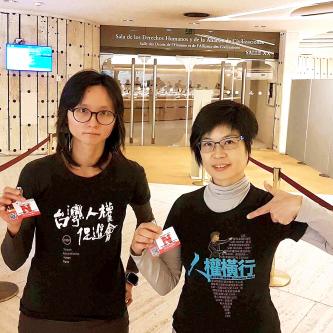Taiwanese rights campaigners on Wednesday testified before the UN Human Rights Council’s Working Group on Enforced or Involuntary Disappearances about China’s detention and trial of human rights advocate Lee Ming-che (李明哲).
The Working Group meets three times a year and its latest session began on Monday. Its primary task is “to assist families in determining the fate or whereabouts of their family members who have disappeared,” and the first three days of each session are devoted to meetings with family members of missing people as well as representatives of non-governmental organizations (NGOs) or governments.
Despite concerns that Republic of China (ROC) passport holders would be barred from the UN’s Palace of Nations in Geneva, Switzerland, during the session, Covenants Watch chief executive officer Huang Yi-bee (黃怡碧) and Taiwan Association for Human Rights secretary-general Chiu Ee-ling (邱伊翎) had no problem entering the building.
Huang and Chiu presented Lee’s case to the Working Group.
“Getting through security was fairly smooth — they just took a quick glance at our passports and passed us through,” Huang said.
The pair said they had not “clearly felt any effects of Chinese pressure,” but had been worried they would be barred for not using Chinese-issued Taiwanese Compatriot Permits for identification.
Reports of ROC passport bearers being denied access to UN facilities began emerging in 2015 after years of Taiwanese journalists being denied credentials.
“While China might not be able to directly influence committee members, there are lots of ways they can interfere indirectly, including through security guards,” Huang said, adding that she had been barred during one of her three previous visits to the UN’s Geneva headquarters in connection with Lee’s case.
“In that case, the security guard was not willing to budge an inch even when a United Nations expert came out to take me in — so the entrance process can be extremely arbitrary,” she said.
Chiu said they had applied to the UN for recognition as NGO representatives, including the invitation from the Working Group.
Huang said that members of the Working Group had asked for them to send additional material about Lee and said they hoped Lee would be able to return home soon.
They also offered their respects to Lee’s wife, Lee Ching-yu (李凈瑜), who was unable to travel with Huang and Chiu to Geneva after learning last week that her husband would be put on trial in Hunan Province on Monday and she traveled to China to attend the trial.
Huang declined to comment when asked whether China’s timing of the trial was a deliberate attempt to interfere with the Working Group session, but said that the group had confirmed that it would continue its investigation into Lee’s case.
“The reason is that even though the trial process has begun, the Chinese government still has not said where he is being held, and the committee also voiced concern over family members’ right to freely enter China to visit him,” she said.
Rights campaigners hope that the Working Group will send official inquiries to China seeking information about Lee Ming-che’s status as part of the campaign to win his freedom.
Additional reporting by Peng Wan-hsin and staff writer
Source: Taipei Times - 2017/09/15





















